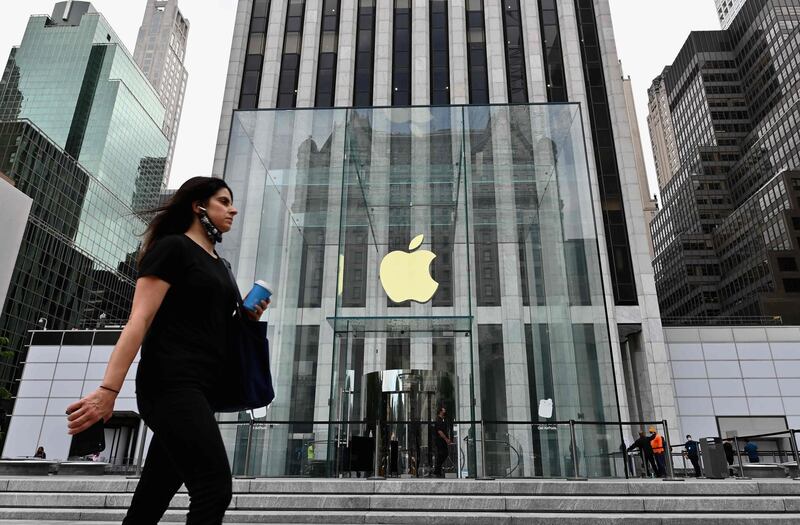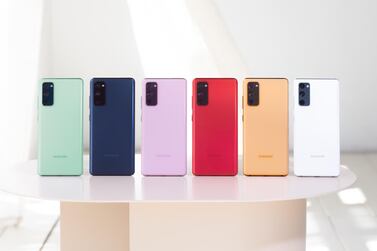Apple’s upcoming 12 series is expected to have four new iPhones – the maximum handsets the company has had in a single line-up, according to the latest industry leaks. These include an iPhone 12 Mini, iPhone 12, iPhone 12 Pro and iPhone 12 Pro Max.
Here is what users can expect in the new roll out.
Cheap pricing to woo budget-conscious customers
The cheapest will be the iPhone 12 Mini, expected to be priced at $649, according to Apple Rumors. It is almost $150 cheaper than the launch price of the entry-level handset in Apple's 11 series rolled out last year. The iPhone 12 Mini's cost could go as high as $799.
The cost of the series' flagship device, the iPhone 12 Pro Max, will range between $1,099 and $1,399. The iPhone 12 will start from $749 and go up to $899 while the iPhone 12 Pro will cost between $999 and $1,299.
Apple did not respond immediately to The National's request for comments to verify these prices.
Will economical devices help drive Apple’s sales?
Lower pricing helped boost sales of the iPhone 11 series, which saw huge demand in the last quarter of 2019. Helped by strong appetite for its cheaper iPhone, Apple sold 70.7 million devices in three months to December, securing 19 per cent of the global market share, according to Strategy Analytics. It was followed closely by Samsung with an 18.4 per cent market share and China’s Huawei, which had a 15 per cent share.
Cheaper offerings might also help Apple compete with mid-range smartphones from Samsung and Huawei and meet its goal of 200 million shipments this year.
Four variants in three sizes
Apple's four iPhones, according to market chatter, are slated to come in three different sizes – a 13.7 centimetre iPhone 12 Mini, a 15.5cm iPhone 12 and iPhone 12 Pro and a 17cm iPhone 12 Pro Max.
Each phone will offer three memory capacities, ranging from 64GB to 512GB. The new iPhones are expected to have a refurbished design similar to that of the iPhone 4, with a square-edged steel frame embedded between two layers of glass.
5G connectivity
The iPhone 12 series will be Apple’s first 5G-enabled model.
Industry analysts say the fifth-generation components will raise production costs by up to $100 but Apple will try to offset the price by reducing supply chain expenses.
The new iPhones may come without a power adapter and wired earbuds, according to Ming-Chi Kuo, an analyst at Hong Kong’s TF International Securities.
Removing the in-box accessories will balance the cost of the 5G components and help Apple sell its new iPhones at a lower price, according to Mr Kuo. It will also reduce the size of packaging, which will help cut down freight charges.
⚡️iPhone 12 PRICING⚡️ I got ✅✅✅
— Apple RUMORs (@a_rumors1111) October 1, 2020
- 12 mini (5.4”) :
64GB $649
128GB $699
256GB $799
- 12 (6.1”) :
64GB $749
128GB $799
256GB $899
- 12 Pro (6.1”) :
128GB $999
256GB $1099
512GB $1299
- 12 Pro Max (6.7”) :
128GB $1099
256GB $1199
512GB $1399
Removing the in-box accessories will balance the cost of the 5G components and help Apple sell its new iPhones at a lower price, according to Mr Kuo. It will also reduce the size of packaging, which will help cut down freight charges.
Many smartphone manufacturers such as Samsung, Huawei, Google, LG and OnePlus already sell 5G-enabled phones.
Availability
The Cupertino-based tech giant is expected to unveil the new phones online on October 13. The customers can expect the delivery by the end of this month.
Apple started the production of its 5G iPhones last month and the mass production is expected to begin this month, according to Japanese newspaper the Nikkei Asian Review.
Apple, which usually unveils new iPhones every September, is running behind schedule due to coronavirus-related production delays.
The company officially confirmed production glitches in July, when its chief financial officer Luca Maestri said during an earnings call that this year’s launches will be a “few weeks later”.
Apple launched only new smartwatches and iPads at an event last month.








